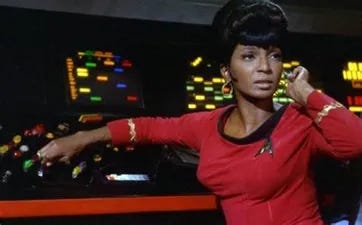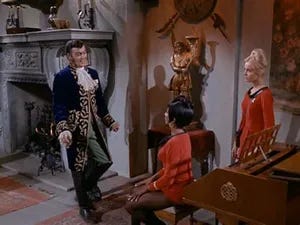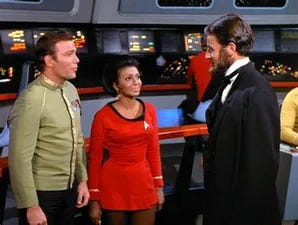With the passing of Nichelle Nichols (born Grace Dell Nichols) this past week, we mark another sad loss of the original Enterprise crew. Like her other Star Trek castmates, Nichols had to live with her alter ego for most of her life, so she did the sensible thing—she embraced it. Her personal website was uhura.com. In it, her “About” message is bright, cheerful and thankful for the life she led.
She started out as a singer and a dancer, and worked with the legendary Duke Ellington. Working with her previously in an earlier television series, The Lieutenant, Gene Roddenberry offered Nichols the role of Lt. Uhura, which Nichols described as groundbreaking. This was due to her role not simply portraying a domestic or some other stereotypical role for a black woman. The short-skirt uniform she wore seemed to be made just for her and all the other ladies simply wore a version of her outfit.
“A Nubian prize!” the character Trelane reacts to her beauty when seeing her in the episode “The Squire of Gothos.” He added, “taken on one of your raids of conquest...?” Trelane only knew about Earth customs from 900 years in the past, so having a black woman amongst them would seem odd. This statement was in stark contrast to her actual role—she wasn’t just an ornament on the bridge, Lt. Uhuru was a fixture on the Enterprise, and it seemed weird when at rare times another actress/character was at her station. She was a key ally and the voice of the ship. Captain Kirk relied on her to connect with the planets they visited and with Star Fleet Command.
Nichols went on to embrace Roddenberry’s vision of the future. It was, she said, “an opportunity to lay the groundwork for what we might actually achieve by the 23rd Century… a bold aspiration and an affirmation of Uhura as we eagerly await her arrival.” That vision agreed in many ways with Martin Luther King’s own vision, and he encouraged Nichols to remain in the role when she considered quitting the series.
There was a key scene that, in my opinion, well portrayed that grand vision of the future in the episode “The Savage Curtain.” The episode features an alien masquerading as Abraham Lincoln, who is for all intents and purposes of the story, the real Lincoln. He sees Uhura on the bridge and notes “Ah, a charming negress.” He pauses after saying this, thinking he has inadvertently said something rude. He apologizes, saying, “Oh, forgive me, my dear, I know that in my time some used that term as a description of property.” Uhura responds by saying, “Why should I object to that term, sir? You see in our century, we’ve learned not to fear words.” Lincoln responds, stating, “The foolishness of my century had me apologizing where no offense was given.”
Granted, Lincoln’s comment is an odd one even if meant with no ill intent. “Ah, a handsome yellow-hued Japanese man,” he could have said just as oddly to Sulu. However, the point was, I believe, to demonstrate that Uhura was completely comfortable with who she was, even proud of that, and that simply naming her as a negress was not an insult to her. You could call her what you liked, but that would not affect her own opinion of herself. She was not afraid of mere words. The interaction also demonstrated charity on the part of Uhura—she did not assume that Lincoln intended to make offense. This is a wonderful vision that seems sadly fleeting today.
My own impression of Nichols as Uhura as I watched the show in the 1970s as a child was that of acceptance. I had no clue that her role was groundbreaking. She was simply Lt. Uhura, the communications officer. Perhaps my mere acceptance showed that the ground had long been broken, that I would not think it odd that a black woman was portrayed working along with the others on the Enterprise bridge.
My best Christmas present ever was the Mego Star Trek Bridge set. I had several of the action figures already, but didn’t have the entire crew. So, it was a bit hard as it felt like I was buying a Barbie doll, but I did in fact purchase a Lt. Uhura figure to complete my bridge set. It just didn’t seem the same without her being there.
May Nichelle Nichols (who was a practicing Presbyterian) find joy with God in the world to come. She is missed.








